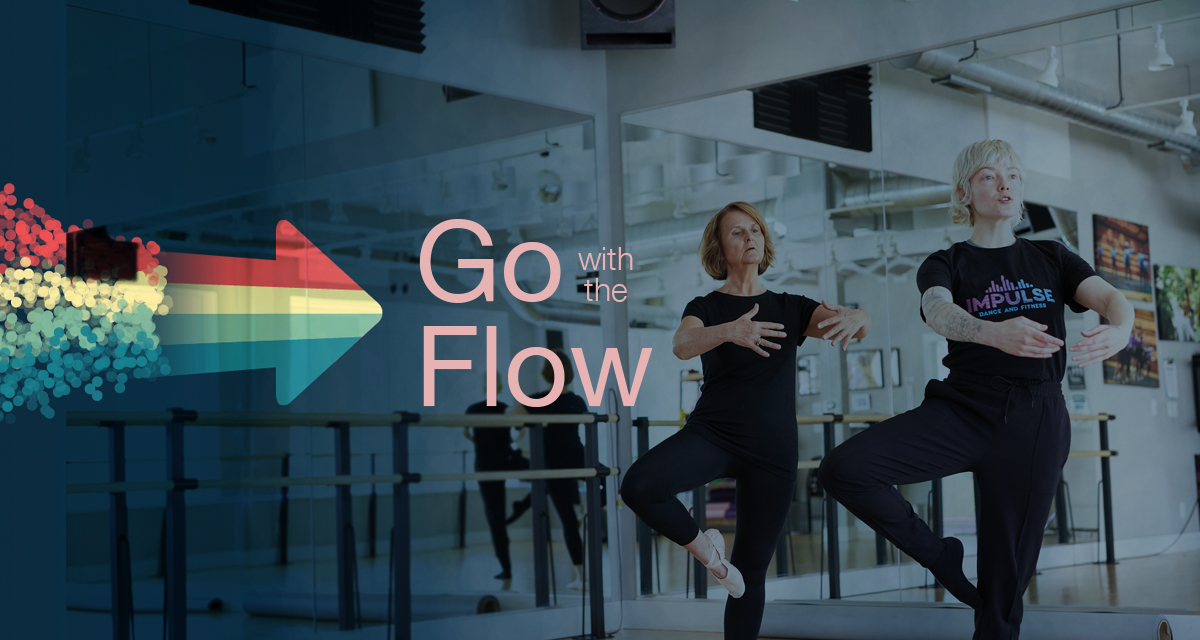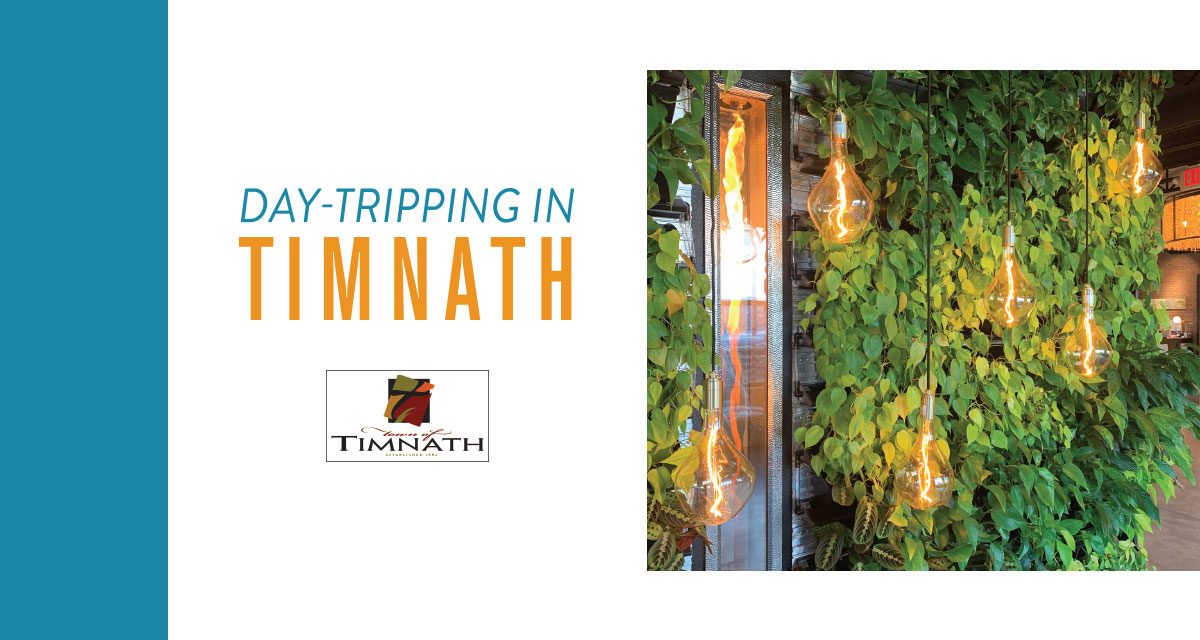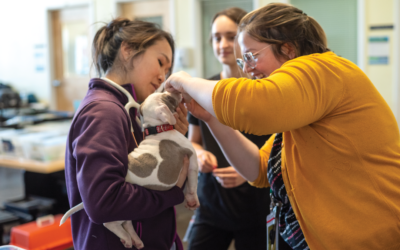By Dan England –
Margo Karsten is an optimistic person, so she thought the adult ballet class she was preparing to enter for the first time would be full of women like her. Instead, she walked into a studio full of 25-year-olds.
Karsten had nothing in common with them, except, perhaps, a need for a hobby. She was 60 and the president of Banner Health’s Western Region, which includes hospitals in Fort Collins, Loveland and Greeley. But she was facing down a pandemic that had left her, and her many co-workers in the health care system, drained and worried about how imbalanced her life had become. As wave after wave hit the 14 hospitals she had on her watch, her life became crazy enough to feel out of control.
She had interests. She liked to hike and run and work out. But she hadn’t had a hobby in a long time. It wasn’t a priority. Ballet, along with piano and an online French course, were attempts to rebalance her life.
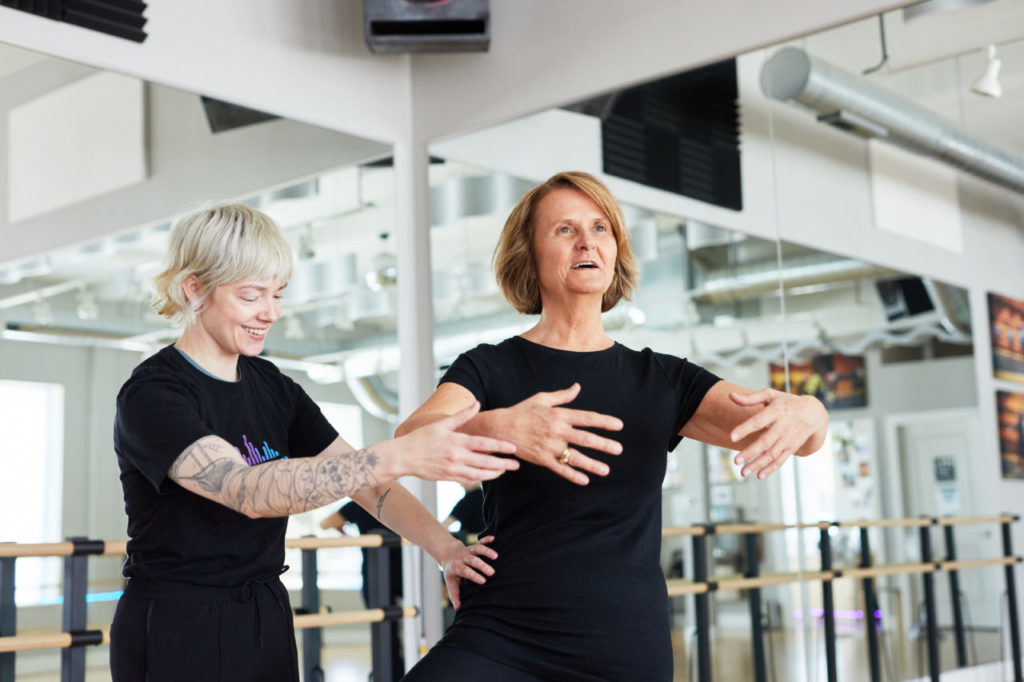
Margo Karsten (left) at a ballet lesson with Amy G. Smith at Impulse Dance and Fitness in Fort Collins. Photo by John Robson Photography.
Karsten saw far too many heart-wrenching moments as she walked through intensive-care units during her check-ins with the hospitals on her roster. Those moments made her realize that life was too short. She knew how desperately she needed something, and she chose ballet for the simple reason that she’d always wanted to try it. She wasn’t going to leave because she was the oldest in the class by 35 years.
But then she got a nice surprise. Rather than laugh at the old lady, the young women were welcoming, even kind, and that helped her set her insecurity aside and own it. Yes, she was 60, but who cares? Yes, it was hard—one of the hardest things she’d ever done—but as a result, she felt something she hadn’t felt in a long time when she exited the class. She felt renewed.
“It was humbling and awesome at the same time,” Karsten says. “Ballet is not easy, so I’m totally focused on the teacher for the full 90 minutes. I had to be so all in.”
The pandemic was especially difficult on those in health care, but it beat up students, teachers, hospitality workers, parents and, well, most everyone else. It brought to light what burnout can do to us, how dangerous it can actually be and, perhaps surprisingly, how important hobbies can be to our wellbeing.
Hobbies not only provide personal satisfaction at a time when that is as valuable as a bucket of bitcoin, they can hypnotize us into forgetting about all our problems, at least for a little while. Some call this being “in the zone” or “zeroed in,” but Lynn Stiff, a family medicine physician for Banner Health who practices in Greeley, calls it flow.
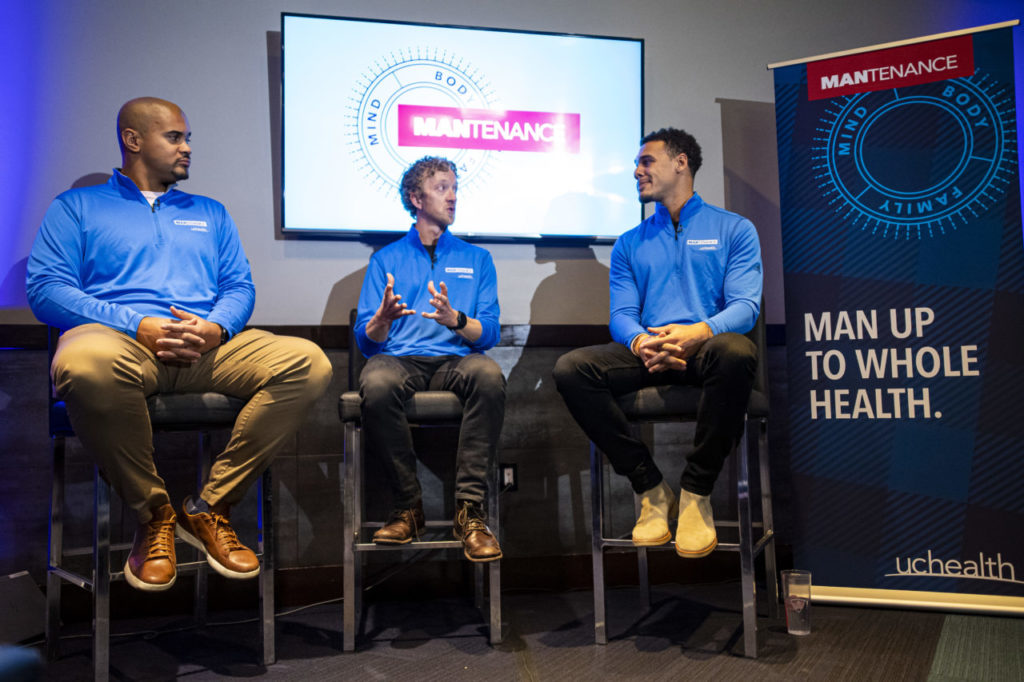
Dr. Ryan Ross (middle) speaking at the 2018 MANtenance event with Denver Broncos teammates Ryan Harris (left) and Justin Simmons (right) about men’s mental health. Photo courtesy of UCHealth.
“Flow is a state where time flies and you are so focused you can forget about everything else around you,” Stiff says.
Burnout was a problem for a portion of her patients during the pandemic, Stiff says. In fact, at least every one of her patients had some form of mental health problems, even if they were happy in their jobs, as they were worried about their kids, their older loved ones or themselves.
“There were so many areas that were impacted,” Stiff says.
But prescribing a way for her patients to reach this state of flow did seem to help. In fact, those who can enter this state at least once a week enjoy enhanced well-being and better health, both physical and mental, Stiff says.
Flow, in other words, can help combat burnout.
This isn’t a sitcom
Justin Ross does not like to compare burnout to “Dilbert,” dissatisfied cubicle dwellers or those funny-sounding workers in “Office Space” combating TPS reports. Instead, he compares it to a burning building.
“When you’re in a burning building, you don’t need flame-resistant clothing,” says Ross, a licensed clinical psychologist and director of UCHealth’s workplace well-being program. “You need to get out of the building.”
Instead, many of us, including health care workers, spent two years going into burning buildings, Ross says. The description sounds dramatic, but it’s also accurate, perhaps more so than the more medical terminology people like him have used to describe the state of mind we were in during the pandemic. Burnout happens when external demands perpetually exceed our capacity to cope with them, and it’s a serious condition characterized by emotional exhaustion, reduced satisfaction in our jobs and in life and even depersonalization. Think of depersonalization as a step beyond compassion fatigue, with a huge helping of hopelessness, Ross says.
“We start to lose empathy for others,” he says. “We think of them as just another problem to deal with.”
Data way back in 2019, just a few months before the pandemic, was already pretty alarming, Ross says, as 50 percent of health care workers were approaching burnout. Many other workers in industries have now reached that point, and the health effects from it can be severe, from a chronic state of depletion to a reduced sense of purpose, in addition to anxiety, severe depression and, ultimately, suicide.
It’s not just the pandemic that’s caused issues. Educators are dealing with difficult political climates as well, says Theresa Myers, spokeswoman for Greeley-Evans School District 6.
“It has been a very stressful time for everyone in our system because of COVID-19,” Myers says. “But also because of some of the politics both nationally and locally that are causing some disruption and focus on public education in general.”
Part of what accentuates burnout, Ross says, is society blames workers for it. So, they feel shame for it. They think they should persevere.
“But you can only be so safe in the middle of a burning building,” Ross says. “Burnout is what’s being done to you instead of how you feel about it.”
Therefore simple validation is the first and most important step to feeling better, Ross says.
“We can’t get anywhere with mental health if we don’t validate what we’re feeling,” he says. “But it’s not sufficient.”
What IS sufficient? Well, a lot of people did find ways to work through it, but that doesn’t necessarily help them in the long game of life, Ross says.
“Once you know better, you need to do better,” he says. “There are ways to help people through burnout.”
Not just a pastime
Hobbies may seem like silly ways to pass the time. People can feel guilty about exploring hobbies and taking the time to do them because they seem frivolous. These are the same feelings that make us feel inferior for acknowledging burnout. But more experts such as Ross and Stiff say they are vital to our mental health, especially in a world that doesn’t apologize for working people to the nub.
Perhaps it was instinct that led Karsten to take up piano, a relic from her childhood, and then ballet, but the more research she did, the more she found how crucial they were to her feeling good.
“It would have been easier to zone out on social media,” she says, “but I knew I didn’t want to do that. It took some discipline to get out [and do something].”
Alas, scrolling through social media or watching crappy television doesn’t have the same effect as an activity that engages us. Flow, Stiff says, is not an easy state to reach, and not all activities get us there. It also takes practice.
“And when you’re thinking about trying to get into that state, that can hinder you from getting into it,” she says. “You have to let go of expectations and reflect on why you are doing it. If, ultimately, you don’t achieve that flow, something is missing. The point is not to worry, and it needs to be something that has no strings attached.”
It’s hard to know whether the Great Resignation is a sign that people recognize burnout or whether they were overcome by it, Ross says. There could be some post-traumatic growth when people go through profound psychological changes. They have a deep reconfiguration of what matters to them in their lives. This could be a hard-working executive who gets cancer, recovers from it and decides to live on a farm rehabilitating horses with her daughter.
“People are recognizing they want to do something else,” Ross says.
It could also mean that workers were traumatized to the point where they suffer the same symptoms of Post-Traumatic Stress Disorder and need to leave their job to get better.
Karsten didn’t have to leave her job. She still works at Banner as an executive, but she feels like her life is balanced again, and she hopes to act as a role model for others in the company. She still works crazy hours but found that she could fit in hobbies. Piano and ballet were both at night, she says, when meetings rarely took place.
“People are trying to accommodate our crazy schedules,” Karsten says, “As awful as it’s been, I think there’s been some good things from COVID-19.”
_________________________________
Dan England is a freelance writer based in Greeley.


